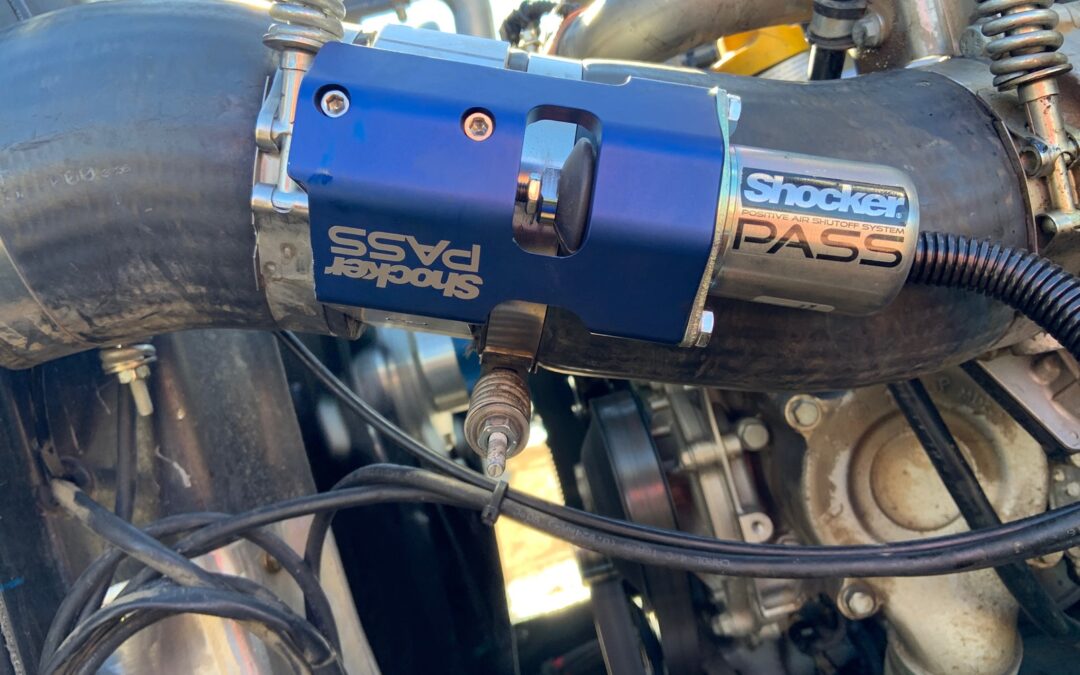If you’re working in an industry with diesel powered heavy duty machinery, it’s important to ensure the safety of not only the people you work with, but also the assets and property found on the job site. Positive Air Shut Off Valves are one of the most effective devices available to prevent dangerous situations arising from diesel engine runaway. This blog will delve into the workings of shut off valves, their importance in industrial safety, and the significant benefits they offer.
The Fundamentals of Positive Air Shut Off Valves
What are Positive Air Shut Off Valves?
Positive Air Shut Off Valves are specialized devices installed in the air intake system valve of diesel engines to prevent uncontrolled engine acceleration, commonly known as “diesel engine runaway.” Diesel engine runaway occurs when an engine begins running uncontrollably due to taking in a fuel source from the air. Oftentimes, the diesel engine begins running away when there are airborne hydrocarbons from a gas leak supplementing the fuel inside of the engine, causing the engine to run faster and faster until the metal becomes red hot and seizes. This can lead to sparks and explosions.
How Do Shut Off Valves Work?
A shut off valve works by cutting off the air supply to the engine when it detects the engine is overspeeding. Here’s a step-by-step breakdown of how they work.
- Detection of Engine Overspeed: Detecting if your diesel engine is overspeeding often occurs automatically due to sensors that monitor the engine’s operating parameters and activate when the RPM gets too high. When these sensors detect conditions indicative of a runaway situation—such as a sudden and uncontrolled increase in engine speed—the shut off is triggered. If you have a manual system, an operator will need to notice that the diesel engine is running away.
- Activation: Upon detecting a potential runaway, the air intake valve closes off the air supply to the engine. If you are working with a manual system, an operator will need to flip the switch to activate the air intake valve.
- Air Supply Cut-Off: The valve quickly shuts off the air supply to the engine. Since diesel engines require air to combust fuel, cutting off the air supply effectively starves the engine, causing it to stop.
- Engine Shutdown: With the air intake blocked, the engine’s combustion process ceases, leading to a rapid and controlled shutdown. This prevents the engine from reaching dangerously high speeds that could result in mechanical failure or catastrophic explosion.
Importance of Positive Air Shut Off Valves for Industrial Safety
Preventing Diesel Engine Runaway
Diesel engine runaway poses severe risks, including mechanical damage and explosions. By installing a positive air shut off valve, you can reliably mitigate the risks of using diesel engines. The shut off valves ensure that any uncontrolled acceleration is swiftly and safely stopped before danger arises.
Protecting Human Lives
In industrial environments, the safety of personnel is always the top priority. Working with diesel engines in an industrial or petrochemical setting can be dangerous, and diesel engine runaway can lead to accidents causing serious injuries or fatalities. By installing a positive air shut off, you’re safeguarding human lives by preventing hazardous situations, ensuring a safer working environment.
Preserving Assets
Machinery and equipment represent significant investments for any industry. Engine explosions can cause irreparable damage to surrounding equipment and infrastructure, leading to costly repairs and downtime. By preventing runaway scenarios, shut off valves help in preserving these valuable assets and maintaining operational continuity.
Types of Emergency Shut Off Valves
There are two main types of positive air shut off valves: automatic configurations and manual configurations.
Automatic Shut Offs
Automatic positive air shut off valves are sophisticated safety devices designed to prevent diesel engine runaway by automatically shutting off the air supply to the engine. These valves are equipped with sensors that continuously monitor the engine’s RPM. If these sensors detect a rapid and uncontrolled increase in RPM, the system immediately triggers the shut off valve to close, cutting off the air supply and stopping the engine. This automated process ensures a swift and precise response to potential dangers, significantly reducing the risk of mechanical failure or explosion. Although automatic shut offs are more expensive due to their advanced technology and integration with control systems, they offer more reliability and safety, making them ideal for environments where quick and autonomous intervention is essential.
Manual Shut Offs
Manual shut off valves require human intervention to prevent diesel engine runaway. An operator must be able to detect signs of a runaway engine, such as an unusual increase in RPM, and manually engage the shut off valve to cut the air supply. While these manual configurations are less costly and can be suitable for equipment that is continuously manned and not in permanent operation, they rely heavily on the operator’s vigilance and timely response. The manual approach is inherently slower and more prone to human error, which can compromise safety in critical situations. Therefore, although manual shut offs can be practical in specific scenarios, automatic shut off valves provide a more robust and trustworthy solution for ensuring continuous protection and preventing catastrophic engine failures.
Benefits of Positive Air Shut Off Valves
Enhanced Safety
The primary benefit of installing a positive air shut off is the enhanced safety they provide. By preventing diesel engine runaway, they protect personnel from potential accidents and injuries. The quick and reliable shutdown mechanism ensures that any dangerous situation is quickly controlled.
Reduced Downtime
Diesel engine runaway, even if it doesn’t end with a catastrophic explosion, can cause significant damage to machinery, leading to prolonged downtime for repairs. Shut off valves protect your equipment, ensuring that operations can continue with minimal interruptions. This translates to higher productivity and better utilization of resources.
Cost Savings
By preventing damage to engines and other equipment, shut off valves help in reducing maintenance and repair costs. Investing in a positive air shut off will provide savings through avoided damage and downtime, plus the safety and peace of mind you receive knowing your team and site is safe.
Regulatory Compliance
Many industries require all diesel engines that are onsite to be equipped with a positive air shut off valve. In Canada, it is required by law to have these safety features installed on trucks transporting class 2 & 3 chemicals, and many industries in the United States are implementing safety equipment requirements. By implementing shut off valves, companies can ensure compliance with these regulations, avoiding potential fines, legal issues, and job shutdowns.
Real-World Applications of Positive Air Shut Off Valves
Positive Air Shut Off Valves are used in a variety of industries where diesel engines are prevalent. Some key applications include:
- Oil and Gas Industry: In this sector, the risk of flammable gas leaks makes positive air shut offs crucial for preventing diesel engine runaway and ensuring the safety of both personnel and equipment.
- Mining: Heavy machinery used in mining operations often relies on diesel engines. Shut off valves help in protecting these engines from runaway scenarios caused by the presence of combustible materials.
- Marine: Marine vessels use large diesel engines for propulsion. Positive air shut off valves are essential in preventing runaway situations that could lead to catastrophic engine failure at sea.
- Power Generation: Diesel engines used in power generation, especially in backup generators, benefit from shut off valves as they ensure the engines operate safely under all conditions.
Future Trends in Positive Air Shut Off Valve Technology
As technology continues to advance, emergency shut off systems are also evolving. Some emerging trends include:

Gas Detection Shut Off Systems
The ShockerEDGE represents the future of positive air shut off valves, setting a new standard in proactive engine safety. This cutting-edge technology, the first and only of its kind, can be installed in any internal combustion engine and utilizes a molecular properties spectrometer to analyze incoming ambient air for dangerous gases. As soon as airborne hydrocarbons (LEL) are detected, the system warns the operator instantly of the danger, then shuts the engine ignition off if the level of LEL reaches 7.5%, providing unparalleled protection.
Unlike traditional systems, the ShockerEDGE requires no docking stations, calibration, bump gas, or instrument technicians, as it continuously monitors and recalibrates itself automatically every two seconds. The ShockerEDGE exceeds industry regulatory requirements in both Canada and the United States, ensuring engines are turned off and potential dangers are addressed well before they become critical issues. This 100% North American designed and built solution is meticulously tested by three people before dispatch, ensuring each unit’s durability and longevity. Custom-built for each order, the ShockerEDGE offers unmatched safety for your workforce and assets, embodying early detection and superior protection.
Trust Headwind Solutions for Your Emergency Shut Off Needs
Positive air shut off valves are indispensable components in ensuring the safety and reliability of diesel engines across various industries. Their ability to prevent engine runaway protects human lives, preserves valuable assets, and ensures operational continuity. With the ShockerEDGE, shut off systems are becoming even more effective and integrated into broader safety and control systems.
For industries that rely on diesel engines, investing in a shut off valve is not just a regulatory requirement but a prudent decision that enhances safety, reduces costs, and supports sustainable operations. As we look to the future, the continued development and implementation of positive air shut off technology will play a crucial role in advancing industrial safety standards, safeguarding both people and assets.
Headwind Solutions offers state-of-the-art emergency shut off technologies like the ShockerEDGE, or our flagship positive air shut off valve, the ShockerPASS. With a commitment to innovation, reliability, and unparalleled quality, our team will provide you with peace of mind through proactive and robust safety measures. By choosing Headwind Solutions, you are investing in the highest level of safety, ensuring that your operations remain secure, efficient, and compliant. Trust in Headwind Solutions to deliver the emergency air shut off systems that safeguard your future.

